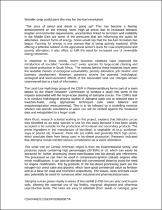JavaScript is disabled for your browser. Some features of this site may not work without it.
- ResearchSpace
- →
- Research Publications/Outputs
- →
- Conference Publications
- →
- View Item
| dc.contributor.author |
Gush, Mark B

|
|
| dc.date.accessioned | 2009-08-12T07:38:38Z | |
| dc.date.available | 2009-08-12T07:38:38Z | |
| dc.date.issued | 2005-03 | |
| dc.identifier.citation | Gush, M.B. 2005. Wonder crop could pave the way for bio-fuel revolution (CSIR Research Report 12) | en |
| dc.identifier.uri | http://hdl.handle.net/10204/3525 | |
| dc.description.abstract | The price of petrol and diesel is going up. This has become a familiar announcement on the news. Oil prices are high due to increased demand, tougher environmental requirements, uncertainties linked to terrorism and instability in the Middle East are some of the pressures that are influencing the quest for alternative, cleaner forms of energy. Some would suggest that the bio-fuel revolution has begun. Because of these trends a recent business initiative has proposed the introduction of the so-called “wonder-crop” an exotic species for large scale planting and bio-diesel production in South Africa. The motive behind these initiatives has been the laudable themes of ecological sustainability, poverty alleviation, job creation and business development. A research has been done by the Land Use Hydrology group of the CSIR in Pietermarizburg, on the impacts associated with the large-scale planting of Jatropha curcas. Jatropha curcas was identified as an ideal species for the study because it has been widely accepted to be suitable for the production of bio-diesel and secondary products. The prime ingredient in the manufacture of bio-diesel is vegetable oil (e.g. sunflower, soya or peanut oil); however, these oils are edible and generally fetch high prices, which preclude them from being used in bio-diesel production. This small tree from the Euphorbiaceae family produces seeds containing high percentages (30-35%) of oil, which can easily be extracted for further processing (trans-esterification into bio-diesel) and refinement. The processed oil can then be used in compression-ignition (diesel) engines after minor modifications. It can also be blended with conventional diesel to avoid the need for engine modification. Research indicated that Jatropha curcas merited serious consideration as a viable alternative | en |
| dc.language.iso | en | en |
| dc.relation.ispartofseries | CSIR Research Report | en |
| dc.relation.ispartofseries | CSIR NRIO | en |
| dc.relation.ispartofseries | 12 | en |
| dc.subject | Wonder-crop | en |
| dc.subject | Bio-diesel | en |
| dc.subject | Bio-fuel revolution | en |
| dc.subject | Oil prices | en |
| dc.subject | Land use hydrology | en |
| dc.subject | Petrol | en |
| dc.subject | Diesel | en |
| dc.subject | Energy | en |
| dc.subject | Oil | en |
| dc.subject | Land use hydrology group | en |
| dc.subject | CSIR | en |
| dc.subject | NRIO | en |
| dc.subject | National Research Institute of Oceanology | en |
| dc.title | Wonder crop could pave the way for bio-fuel revolution | en |
| dc.type | Conference Presentation | en |
| dc.identifier.apacitation | Gush, M. B. (2005). Wonder crop could pave the way for bio-fuel revolution. http://hdl.handle.net/10204/3525 | en_ZA |
| dc.identifier.chicagocitation | Gush, Mark B. "Wonder crop could pave the way for bio-fuel revolution." (2005): http://hdl.handle.net/10204/3525 | en_ZA |
| dc.identifier.vancouvercitation | Gush MB, Wonder crop could pave the way for bio-fuel revolution; 2005. http://hdl.handle.net/10204/3525 . | en_ZA |
| dc.identifier.ris | TY - Conference Presentation AU - Gush, Mark B AB - The price of petrol and diesel is going up. This has become a familiar announcement on the news. Oil prices are high due to increased demand, tougher environmental requirements, uncertainties linked to terrorism and instability in the Middle East are some of the pressures that are influencing the quest for alternative, cleaner forms of energy. Some would suggest that the bio-fuel revolution has begun. Because of these trends a recent business initiative has proposed the introduction of the so-called “wonder-crop” an exotic species for large scale planting and bio-diesel production in South Africa. The motive behind these initiatives has been the laudable themes of ecological sustainability, poverty alleviation, job creation and business development. A research has been done by the Land Use Hydrology group of the CSIR in Pietermarizburg, on the impacts associated with the large-scale planting of Jatropha curcas. Jatropha curcas was identified as an ideal species for the study because it has been widely accepted to be suitable for the production of bio-diesel and secondary products. The prime ingredient in the manufacture of bio-diesel is vegetable oil (e.g. sunflower, soya or peanut oil); however, these oils are edible and generally fetch high prices, which preclude them from being used in bio-diesel production. This small tree from the Euphorbiaceae family produces seeds containing high percentages (30-35%) of oil, which can easily be extracted for further processing (trans-esterification into bio-diesel) and refinement. The processed oil can then be used in compression-ignition (diesel) engines after minor modifications. It can also be blended with conventional diesel to avoid the need for engine modification. Research indicated that Jatropha curcas merited serious consideration as a viable alternative DA - 2005-03 DB - ResearchSpace DP - CSIR KW - Wonder-crop KW - Bio-diesel KW - Bio-fuel revolution KW - Oil prices KW - Land use hydrology KW - Petrol KW - Diesel KW - Energy KW - Oil KW - Land use hydrology group KW - CSIR KW - NRIO KW - National Research Institute of Oceanology LK - https://researchspace.csir.co.za PY - 2005 T1 - Wonder crop could pave the way for bio-fuel revolution TI - Wonder crop could pave the way for bio-fuel revolution UR - http://hdl.handle.net/10204/3525 ER - | en_ZA |






